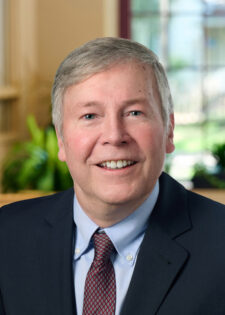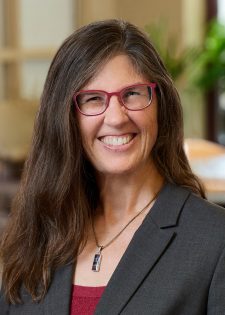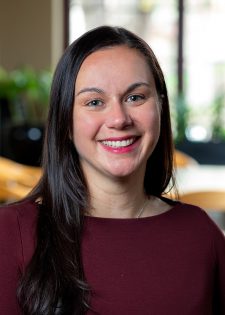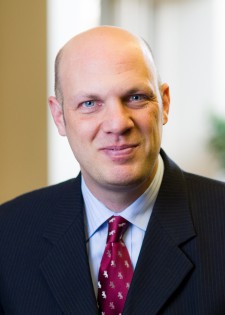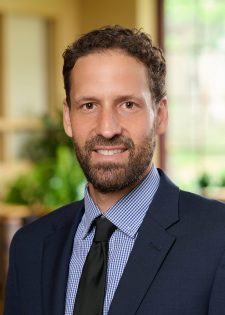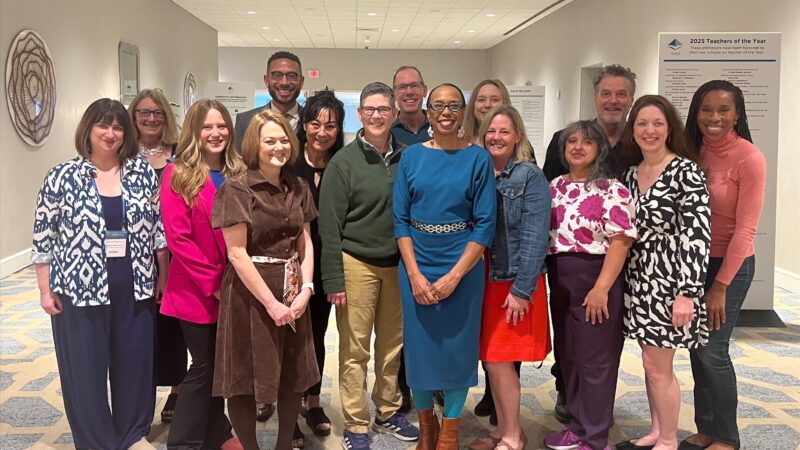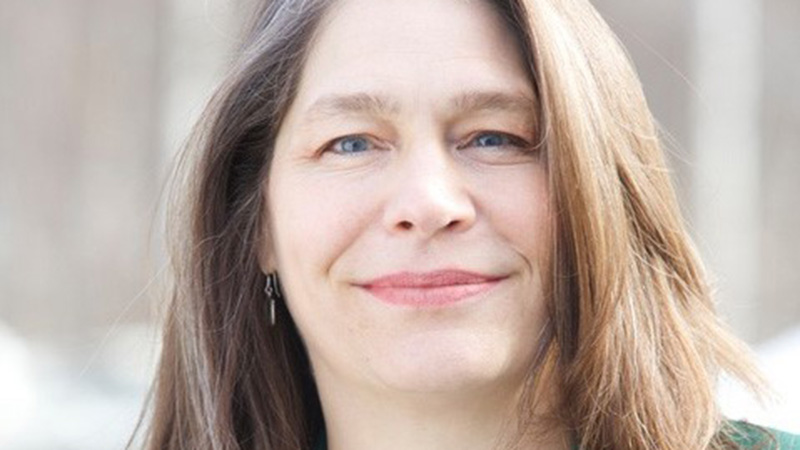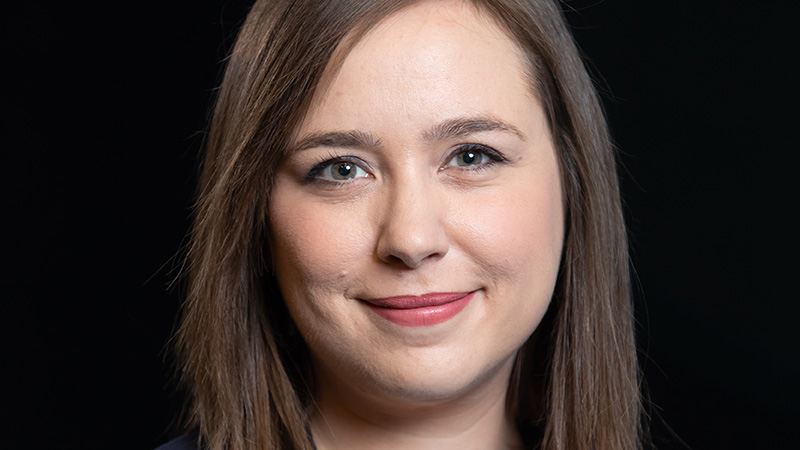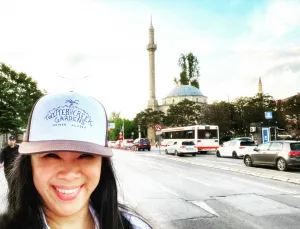
Kim Vu-Dinh standing on the streets of Pristina during a trip to Kosovo this summer.
Professor Kim Vu-Dinh traveled to Kosovo this summer, her second trip to the country as she continues building relationships that she began before her time at Mitchell Hamline. Her hope is to expand learning opportunities for Mitchell Hamline students to better understand the contemporary development of post-Soviet nations. Those opportunities will begin this fall starting with Kosovo.
Vu-Dinh’s time in Kosovo is a combination of two long-held interests. One, in the transformative steps that have happened in Eastern Europe since the fall of the Soviet Union in 1991. And two, in finding ways to foster economic development in underrepresented communities. Vu-Dinh has devoted much of her legal and teaching career to that second challenge and much of her academic career on the first. She studied abroad in Vietnam and Hungary while majoring in development studies.
In 2019, she was named a Fulbright specialist and served as a Fulbright-funded consultant at the University of Applied Sciences in Ferizaj. The new university was looking for an American legal academic to help in its development. Vu-Dinh worked with faculty and academic administration in helping develop a small-business incubator that would give students hands-on learning while generating income for the fledgling school.
“It was a very exciting opportunity,” she said. “I went there and counseled them on different structures used at American universities and helped draft legal documents they wanted in order to build social entrepreneurship opportunities where students would provide design and architecture services for real clients.”
Kosovo had fought a bloody war with Serbia in the late 1990s and declared independence in 2008. Democratic institutions were nascent. Several American institutions, including the National Center for State Courts, provided guidance and assistance to the country’s leadership. Judges from Minnesota were among those who visited the country as consultants and mentors to the new democracy.
Vu-Dinh had worked at her previous institution to connect with Kosovo’s academic leaders, hoping to provide opportunities for academics and members of the Kosovar judiciary to travel to Arkansas for educational exchanges. Those plans, set to launch in the spring of 2020, were halted because of the COVID pandemic. Subsequent reschedules were similarly halted as new variants emerged.
In 2022, Vu-Dinh joined Mitchell Hamline, where she debuted an Economic Inclusion Clinic modeled on her clinical work in Arkansas. She also renewed her connections in Kosovo and returned to Kosovo this summer with plans that could create new learning opportunities for students in both nations.
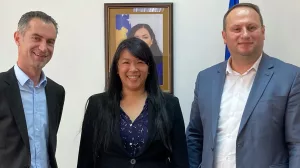
Prof. Kim Vu-Dinh (center), with Shkëlzen Maliqi (left), director general of the Kosovo Judicial Council Secretariat, and Judge Albert Zogaj (right), chair of Kosovo’s Supreme Court, during her trip to Pristina this summer.
Reflecting on her recent trip, Vu-Dinh found her work even more relevant in the shadow of the on-going war between Russia and Ukraine. “There is still a lot of value in learning about the effects of the fall of the Soviet Union, and I feel what is happening in Kosovo today will be highly relevant for the Ukraine of tomorrow,” she said.
“I want our students to see the positive roles we can play as lawyers with American education.”
During her trip, Vu-Dinh met with Judge Albert Zogaj, chair of Kosovo’s Supreme Court, and Shkëlzen Maliqi, director general of the Kosovo Judicial Council Secretariat, to discuss opportunities for American students and faculty to visit Kosovo.
Vu-Dinh’s plans now call for a close connection between the University of Applied Sciences in Ferizaj and Mitchell Hamline. Starting this fall, UAS Ferizaj will be a client of Mitchell Hamline’s Economic Inclusion Clinic, and Vu-Dinh envisions an advisory role that her students can provide for those in Ferizaj.
UAS Ferizaj focuses on high-level trade training—architecture, high-end furniture design—and students there need to have a better understanding of how to comply with international trade laws to commercialize their products in the US, noted Vu-Dinh.
“The idea is that we can help them understand how trade with the U.S. works and how our intellectual property law works,” she said. “We might also end up having our students counsel them on business and social-enterprise financing law for educational institutions like them with a double bottom line. That is, they want to be fiscally solvent and stable, but they have more than just money as their end goal.
“They want to help their students envision how their work can be part of Kosovo’s economic development in a sustainable way.”
Ultimately, Vu-Dinh says, she’d like to see students traveling in both directions. She hopes to bring American students to Kosovo and believes Mitchell Hamline is well-placed, for instance, to provide LL.M training for members of the Kosovar judiciary through the school’s blended program, which reduces the time they would need to spend away from their families.
“Mitchell Hamline has long had relationships with academics and universities in several countries,” she said. “We have wonderful programs for our students to study in Israel and England, as well as international students enrolled in our courses taught here in the U.S.
“I’m excited to add Kosovo to that list this fall with our clinic and hopefully so much more beyond that. I think our students will appreciate the opportunities and so will our international partners.”
This article was written by Dick Dahl, a freelance writer in the Twin Cities.
Mitchell Hamline faculty
The latest from Faculty in the News
ThinkTech Hawaii January 28, 2026
BBC December 21, 2025
ThinkTech Hawaii January 14, 2026
The latest faculty publications
Star Tribune January 9, 2026
Critical Care Medicine 54(1):p 154-162, January 2026 January 1, 2026
64 University of Louisville Law Review 77 (2025) December 15, 2025
The latest faculty headlines
Mitchell Hamline faculty showcase expertise at 2026 AALS Annual Meeting
From left: Miriam Itzkowitz, Laura Reilly ’94, Natalie Netzel ’15, Tressa Ries, Jared Mollenkof, Kaori Kenmotsu ’22, Carolyn Grose, Anthony Niedwiecki, Camille Davidson, Eleanor Frisch, Lynn LeMoine ’11, Hetal Dalal, Brad Colbert ’85, Leanne Fuith ’10, …
Mitchell Hamline welcomes Jessica West to faculty
Assistant Professor of Law Jessica West Joining the Mitchell Hamline faculty as an assistant professor of law, Jessica West combines a passion for student success with her experience as a practitioner to help law students build the skills they need for …
Eleanor Frisch joins legal writing faculty
Assistant Professor of Law Eleanor Frisch Having a strong sense of justice and being skilled at argumentation are what first led Eleanor Frisch (they/she) to a career in law, but it is a much deeper passion that has turned her now to teaching—a love fo …

